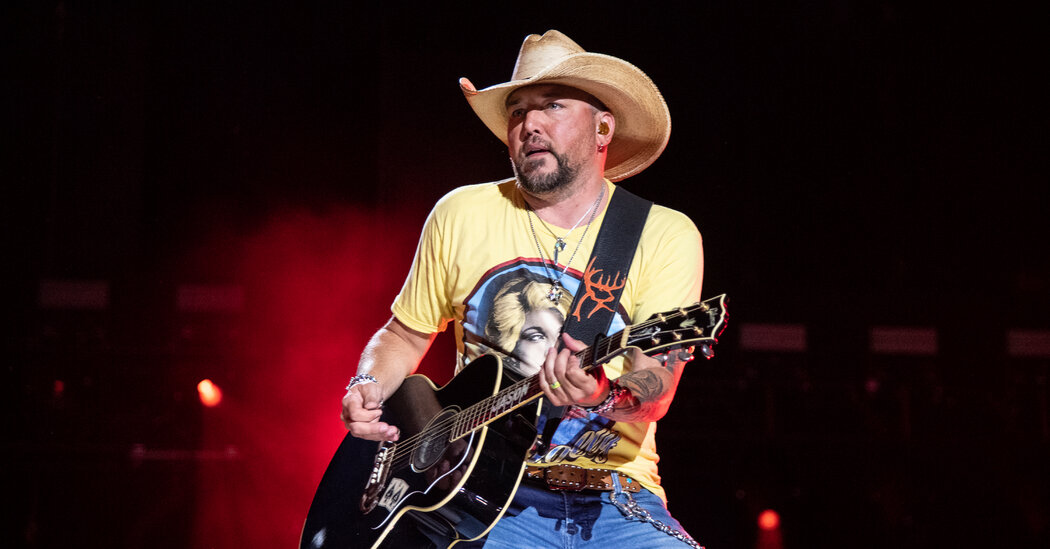
In May, the country star Jason Aldean released a single, “Try That in a Small Town,” with lyrics that paint contemporary urban life as a hellscape of crime and anarchy: “Sucker punch somebody on a sidewalk/Carjack an old lady at a red light.”
“You think you’re tough,” Aldean sings. “Well, try that in a small town.”
Initially, the track got relatively little notice, landing at No. 35 on Billboard’s Hot Country Songs chart. That changed last week, after the song’s music video became a culture-war battlefield, with some accusing Aldean — one of country’s biggest hitmakers for nearly two decades — of employing racist dog-whistle tactics and the singer defending himself as the latest victim of an out-of-control “cancel culture.”
The controversy led to a rush on Aldean’s song, with both streams and downloads exploding over the course of last week. “Try That in a Small Town” makes its debut at No. 2 on the Hot 100, Aldean’s best showing ever on Billboard’s all-genre pop chart, beating current hits by Olivia Rodrigo and Morgan Wallen. Aldean was surpassed this week only by Jung Kook of the South Korean supergroup BTS, whose debut solo single, “Seven,” opens at No. 1.
The video for “Try That,” released on July 14, opens with Aldean performing before a stately building draped with an American flag; the structure was quickly identified as Maury County Courthouse in Columbia, Tenn., where in 1927 a young Black man named Henry Choate was lynched by a vigilante mob after being accused — falsely, historians believe — of raping a white girl.
The video features one montage after another of violent street protests, robberies and people antagonizing police officers in riot gear. Those scenes are juxtaposed with images of American flags being hoisted, children playing and what appears to be a television news segment about farmers helping out a neighbor.
Three days after it was released, the video was pulled from rotation on Country Music Television, without explanation. But it has been widely criticized as a thinly veiled attack on the Black Lives Matter protests in 2020.
Justin Jones, a Tennessee state representative, wrote on Twitter that lawmakers “have an obligation to condemn Jason Aldean’s heinous song calling for racist violence. What a shameful vision of gun extremism and vigilantism.”
Aldean, 46, has denied that race plays any part in the lyrics, or that “Try That” is a “pro-lynching song,” saying on social media, “These references are not only meritless, but dangerous.”
Some artists came to his defense, including the country singer Cody Johnson, who said at a concert, “If being patriotic makes you an outlaw, then by God, I’ll be an outlaw.” Ted Nugent, who relishes any scuffle with liberals, said on Fox News, “The idiots hate this Jason Aldean song because they hate when we push back against violence.”
At a concert in Cincinnati on Friday, Aldean was defiant. “Cancel culture is a thing,” he told the crowd at the Riverbend Music Center. “It’s something where if people don’t like what you say, they try and make sure they can cancel you, which means try to ruin your life, ruin everything.”
“What I am is a proud American,” he added. “I love our country, I want to see it restored to what it once was before all this [expletive] started happening to us.” Chants of “U.S.A.” rang out in the amphitheater.
Aldean is no stranger to controversy. In the past he has appeared in blackface for a Halloween costume and worn T-shirts onstage with the Confederate battle flag.
As the debate over “Try That in a Small Town” boiled last week, the song’s consumption metrics spiked. According to Billboard, when the video was released the track had been getting about 1,000 download sales and 200,000 streams a day in the United States. But it closed the week with 228,000 sales — up more than 27,000 percent from the week before — and 11.6 million streams, according to data from the tracking service Luminate.
While Aldean has long posted country hits, “Try That” is his first song to crack the Top 10 of the mainstream Hot 100 chart since 2011, when “Dirt Road Anthem” went to No. 7. (Aldean’s last single, “That’s What Tequila Does,” peaked at No. 77 earlier this year.)
Jung Kook’s “Seven,” featuring Latto, opened at No. 1 on the singles chart with 21.9 million streams, 153,000 sales — as downloads and CD singles — and a radio audience of 6.4 million in the United States.
On the latest album chart, Taylor Swift holds at No. 1 for a second week with “Speak Now (Taylor’s Version),” which had the equivalent of 121,000 sales in the United States, including 96 million streams and 47,000 copies sold as a complete package, according to Luminate. It is the third entry in Swift’s project to rerecord her first six albums, and each has gone to No. 1.
Swift has three other albums in the Top 10: “Midnights,” her last studio album, is No. 4, “Lover” is No. 6 and “Folklore” is No. 10.
Wallen’s latest album, “One Thing at a Time,” holds at No. 2, while his previous LP, “Dangerous: The Double Album,” is No. 5. “Génesis,” by the Mexican songwriter Peso Pluma, is in third place.













